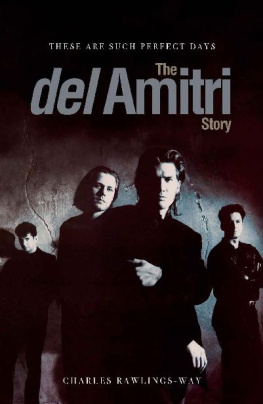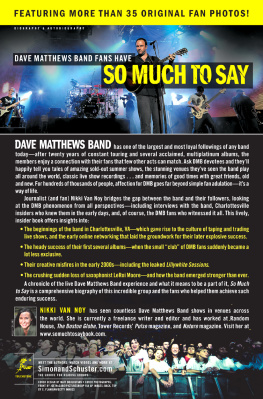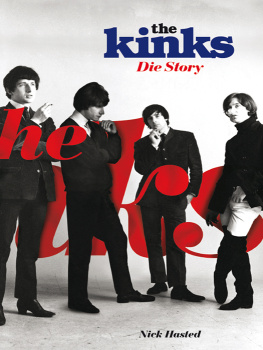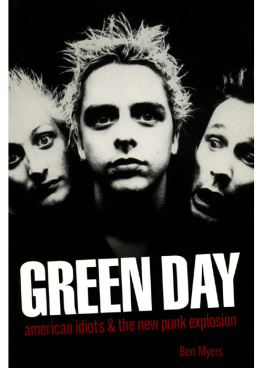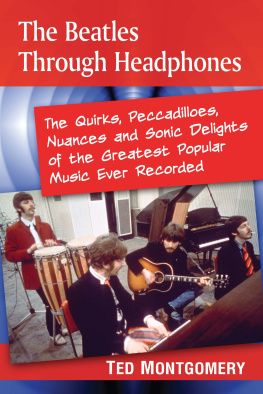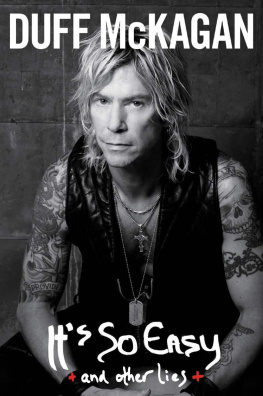The moral right of Charles Rawlings-Way to be identified as the author of this work has been asserted in accordance with the Copyright, Designs and Patents Act of 1988.
All rights reserved. No part of this publication may be reproduced, stored in a retrieval system, or transmitted in any form or by any means, electronic, mechanical, photocopying, recording or otherwise, without the prior permission of both the copyright owner and the above publisher of this book.
A CIP catalogue record for this book is available from the British Library.
forewords
The story of all pop groups is essentially the same: from nothing and nowhere, young folk cohere, collaborate and through perseverance and blind luck have a brief moment ablaze, before flickering out in acrimony, apathy, penury or all three.
When Charles approached me about his desire to tell the tale of Del Amitri, I immediately launched a campaign to dissuade him. Theres no story, I wrote, and besides, nobody cares. But slowly his enthusiasm and stealthy flattery won me round, and I approached the bands other majordomo, Iain, with my recommendation that we at least let this Australian fool have a go by lending him our support.
The experience proved rather joyful. I opted for face-to-face internet video interviews conducted at ungodly hours for both subject and author: late night for me, stupid oclock for Charles. Sometimes wed talk for three hours, during which I might consume a bottle of red wine and take four toilet breaks. I was a smoker for many of these sessions, and watching a fresh-faced, early-morning Charles smiling, collating and listening made me feel like a midnight bum boring the eyes out of a night-shift nurse.
Memory was problematic. The ship of ones fifties is just remote enough from the shore of ones twenties that much communication is compromised. I could still hear that young man calling out his desires and fears but many details were blown away by the wind. Perhaps much that really matters is now lost in the darkness. Perhaps it never mattered at all. I worried that I was missing out critical scenes and conflating major events on the journey. But I told myself that wasnt important. It was Charless book and his story to uncover. I hoped that I was honest but also knew that nobody is ever honest, even half-cut and rambling to that night-shift confessor.
A groups story is its myth of justification: We had it hard, we fought like dogs to make it. But Del Amitri had it easy, mainly. Nobody ended up in jail or in the madhouse. We became quite rich without major regrets about artistic compromise or moral turpitude. Sure, we behaved like arseholes sometimes, but not major ones. No-one took heroin or accidentally killed their girlfriend. The mild form of fame we experienced consisted mostly of strangers being generous. For the majority of our time we even had a record company we loved. We had two brilliant, honest and hard-working managers. Our friends stuck with us, happy to see us succeed. Our families, so essential for support early on, celebrated our ascent selflessly. No-one seemed to resent that the limelight suddenly shone on us and continued to for a decade. I suppose thats the story.
I still listen to Del Amitri, sometimes even when Im sober. The songs Iain and I (and others) wrote fill me with pride. I love them (and the young men who made them) more than anything else. So I dont think its crazy when people tell me that a song of ours changed their lives. They changed ours forever and were supremely grateful that they did.
In the blizzard of internationally successful Scottish rock and pop groups whipped up by the twin fronts of Simple Minds and Orange Juice in the early 1980s, Del Amitri are usually written out of the various histories. I understand that and dont resent it. Something has to be written out. There is something irrelevant about us we dont really belong anywhere. We were in-between, not in a scene. Not even anomalous enough to be called an irritant.
When reuniting in 2014 for a tour, I burst out crying backstage before the first gig and Iain did the same onstage during the last. Fucking 80s jangly wimps. Dressing up in leather, acting like rock stars. Who do they think they are? I like to think we know exactly who we are, and that amusing knowledge has been our greatest strength. That and the folk who followed us. They were also in on the secret.
Maybe this book will whisper it a little louder.
Justin Currie, Glasgow 2017

At the height of the bands popularity, in a bar somewhere filled with people flush with success and whisky after a show, I remember a conversation about how someone will write a book about this one day. It seemed as improbable to me then as it does now. During the twenty years that we dedicated ourselves doggedly and passionately to writing and recording songs, and performing them to whoever would listen, we were convinced that our music spoke for itself. We would have scoffed at the idea that anyone would consider writing a book about Del Amitri (but we would, of course, have been secretly flattered.) Maybeback then, it would have been a potentially bankable enterprise for some devious tabloid hack to make the story of Del Amitris rise to fame salacious enough to sell. Thankfully that book never crawled from the swamp.
It is uplifting to be reminded that in the selfish urge to satisfy your soul and placate your muse, lies the possibility to affect someone else (even if the effect is to irritate and annoyshit! Some of our music certainly achieved that). Immersed in the hedonistic world of recording and touring and (minor) celebrity, it is easy to succumb to arrogance and take that possibility for granted. We played more hungover early-morning radio slots and gave more bratty, desultory interviews than we had any right to get away with but what gave us that hubris was our passionate belief in the music we were making. Even when we were forced to make concessions to the game of chart positions or acquiesce to some corporate bullshit, we strove to keep the music in focus.
Some artists thrive on creating themselves, or at least their projection on to the world, but we were really only concerned with the music we made. Effort and love went into making the Del Amitri albums; effort and love that you can hear if you care to listen. It shines through in Hugh Jones godlike engineering and production of

